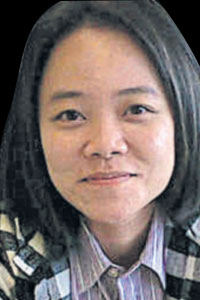Covid-19 has changed people's lives drastically in many ways. For one, masks have become essential items now while hybrid workplaces, remote learning, and cashless shopping are normal practices. We will also never feel at ease riding in an elevator with strangers the way we did before.
But for those infected with Covid-19, new challenges have emerged. Although their bodies are free of the virus, many do not actually recover. As they battle an emotional toll, the symptoms come back.
Long Covid is the term used to describe this phenomenon. Even though it's still unknown to many, some Thais who have caught Covid-19 are familiar with the condition.
Thailand has started paying attention to the so-called "Covid long-haulers" in recent months, especially after the Department of Medical Services earlier this month organised a special forum addressing long Covid, with a specialist from the Central Chest Institute of Thailand giving data and an explanation as to what long Covid really is and its prevalence in Thailand.
The specialist said that in Thailand, people falling prey to long Covid are mostly those aged 60 and above or those with underlying diseases. Covid long-haulers will have to fight persistent symptoms for up to six months. During this period, the disease is not contagious.
The forum also compared the prevalence of long Covid in Thailand to other countries, saying that while up to 50% of Covid-19 patients elsewhere are likely to suffer continuing symptoms, the prevalence is lower in Thailand -- the incidence is only 20%-30%.
But the point we overlook or miss -- and perhaps the most important question -- is whether the country is ready to handle the impacts of long Covid? What kind of support and assistance should be offered to Covid long-haulers?
Assoc Prof Dr Thira Woratanarat of Chulalongkorn University's Faculty of Medicine recently addressed long Covid on his Facebook page. He warned against Thailand placing hope in Covid-19 vaccines as a shield. Though vaccines can lower disease severity and prevent fatalities, evidence shows that those getting the jab can still contract and spread the virus. Vaccines, he said, are not a 100% guarantee.
Subsequently, if the infection cannot be controlled, the country will face long-term consequences of the pandemic and long Covid.
So as the government moves towards opening the country and healing economic scars, they must not overlook the next and longer wave of the pandemic. This is because long Covid is not just Thailand's public health issue but an international concern.
Earlier this year, the World Health Organisation (WHO) urged nations to prioritise rehabilitation for people across the globe dealing with medium and long-term consequences of Covid-19. The WHO is also working with experts and individuals with long Covid from many countries to develop a clinical case definition of persistent Covid-19 symptoms that can be considered a milestone that will help coordinate data collection and diagnosis around the world.
Many other countries are also preparing special and concrete healthcare systems to lend a helping hand to Covid long-haulers. For example, earlier this year, the United Kingdom's Department of Health and Social Care allocated an additional budget of £18.5 million (843 million baht) for research projects to better understand the causes, symptoms and treatment of long Covid.
The same is true for Germany where its Federal Ministry of Education and Research gave €5 million (195 million baht) for long Covid research. Meanwhile, a few months ago, the Italian government also announced it would allocate €50 million (1.9 billion baht) to help with the treatment of approximately 164,000 people suffering long Covid.
As Thailand is now discussing when to open the country to international tourists, allowing antigen test kits to be sold in general stores, and examining the side effects of certain vaccines on children, it's also time the government and stakeholders to consider the issue of long Covid.
Like Covid-19 itself, the long-term impact can be a burden not just physically but also emotionally and financially. And of course, people's lives are more important than the country's reopening.
Arusa Pisuthipan is the Editor of Life, Bangkok Post.
